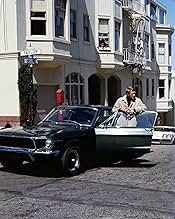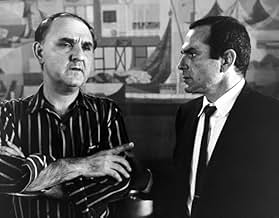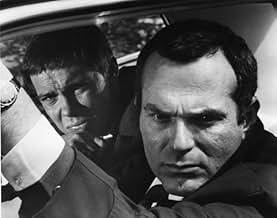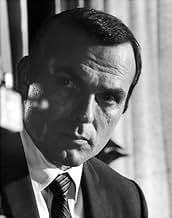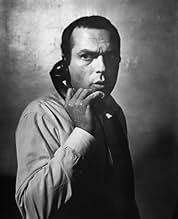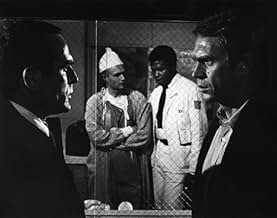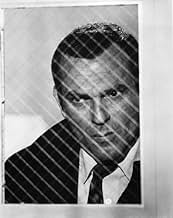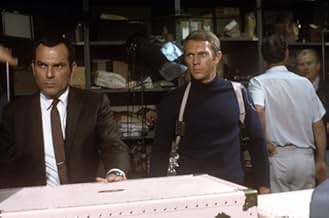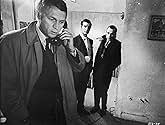Um policial de San Francisco, corajoso e sem escrúpulos, decide encontrar o chefe que matou a testemunha baixo sua proteção.Um policial de San Francisco, corajoso e sem escrúpulos, decide encontrar o chefe que matou a testemunha baixo sua proteção.Um policial de San Francisco, corajoso e sem escrúpulos, decide encontrar o chefe que matou a testemunha baixo sua proteção.
- Direção
- Roteiristas
- Artistas
- Ganhou 1 Oscar
- 7 vitórias e 9 indicações no total
Vic Tayback
- Pete Ross
- (as Victor Tayback)
- Direção
- Roteiristas
- Elenco e equipe completos
- Produção, bilheteria e muito mais no IMDbPro
Avaliações em destaque
The first lone-wolf cop story plays by the rules of the genre it spawned, featuring a charismatic, outsider type who carries a badge and an attitude directed just as much against the egos and hubris of his superiors as against the criminal element.
Frank Bullitt (Steve McQueen) is a detective lieutenant on the San Francisco police force who gets handed a "babysitting job" looking after a would-be Mob informant by ambitious politico Chalmers (Robert Vaughn). Things go wrong with an attempted hit that leaves the informant and his guard in intensive care and Bullitt on the wrong side of Chalmers, not to mention a pair of killer hoods who tool around in a Dodge Charger and have no respect either for stop signs or Mustangs.
"Bullitt" the movie is best-known for an automotive duel between the assassin duo and Bullitt, still championed by some as the greatest car chase in movie history. I think it's been lapped myself, though I admire the long sections of real-time churn-and-burn since it flies in the face of MTV-style fast cutting we know today. The hoods Bullitt chase look like insurance salesmen, but of course they were really stunt men, and with McQueen doing a good deal of his own stunt driving as well, there's a validity to the sequence that makes up for some slackness in the composition.
"Bullitt" is a better film for the things that occur around the car chase, not so much with the central mystery of Johnny Ross as with the scenes of Bullitt in his element, like making coffee, talking with his superiors, eating a sandwich. McQueen's acting was showcased better in films like "The Sand Pebbles," "The Cincinnati Kid," and even his final film "The Hunter," but his star power was never more in evidence than it was here, especially in the scenes he shares with Vaughn, who plays the role of a preppy hardass to perfection and gives both McQueen and the viewer a foil more evil than the real crooks in this picture.
Seeing Bullitt handle Chalmers' baiting is a real lesson in how less is more. There's a scene where a fingerprint check gives Bullitt the opportunity to let Chalmers have it, but instead of rounding on the jerk, he simply tells Chalmers the score as he makes for the door in one of the great underplayed lines ever filmed.
Verisimilitude is everything in "Bullitt," as director Peter Yates and screenwriters Alan Trustman and Harry Kleiner present it. Long scenes are shot in operating rooms, morgues, and hotel-room crime scenes as a way of presenting what we are seeing as real in a way no other film did then and few have done since. Every shot, as Yates explains on his DVD commentary, was shot on a real location, and you feel like he got it all down exactly right, getting the right mix of style and drab reality. A shot cop moans while blood pulses through his wound, while a strangled woman is seen in such gory detail we understand another character's need to throw up over it. Throughout there's Bullitt as only McQueen could play him, saying the right line the right way, jumping in an ambulance to fix a problem, telling his gorgeous girlfriend (Jacqueline Bisset) "It's not for you, baby" in a way that comes off utterly cool rather than gratingly sexist.
I couldn't figure out what was going on with the crooks "the Organization" as they are dubbed since calling them the Mafia was seen as demeaning to a particular ethnic group not yet known for creating films like "The Godfather" or "GoodFellas" not until I watched "Bullitt" a second time, at which point I realized that wasn't so important. "Bullitt" has an annoying subtext of police work as dehumanizing, something Bullitt understands implicitly makes him a tool for the wrong sort of people. That was the year that was 1968, Chicago and all that, but the au currant anti-establishment notes do rankle.
But McQueen was a cinematic great, one who doesn't get as much attention today but proves here why his image is so enduring. Yates credits the clothes McQueen wears, but Yates himself, along with his writers, Vaughn, Bissett, and a terrific supporting cast led by Simon Oakland as Bullitt's tough-but-fair captain, create one of the great platforms for a movie tough guy ever built, a platform McQueen fills very, very well.
Frank Bullitt (Steve McQueen) is a detective lieutenant on the San Francisco police force who gets handed a "babysitting job" looking after a would-be Mob informant by ambitious politico Chalmers (Robert Vaughn). Things go wrong with an attempted hit that leaves the informant and his guard in intensive care and Bullitt on the wrong side of Chalmers, not to mention a pair of killer hoods who tool around in a Dodge Charger and have no respect either for stop signs or Mustangs.
"Bullitt" the movie is best-known for an automotive duel between the assassin duo and Bullitt, still championed by some as the greatest car chase in movie history. I think it's been lapped myself, though I admire the long sections of real-time churn-and-burn since it flies in the face of MTV-style fast cutting we know today. The hoods Bullitt chase look like insurance salesmen, but of course they were really stunt men, and with McQueen doing a good deal of his own stunt driving as well, there's a validity to the sequence that makes up for some slackness in the composition.
"Bullitt" is a better film for the things that occur around the car chase, not so much with the central mystery of Johnny Ross as with the scenes of Bullitt in his element, like making coffee, talking with his superiors, eating a sandwich. McQueen's acting was showcased better in films like "The Sand Pebbles," "The Cincinnati Kid," and even his final film "The Hunter," but his star power was never more in evidence than it was here, especially in the scenes he shares with Vaughn, who plays the role of a preppy hardass to perfection and gives both McQueen and the viewer a foil more evil than the real crooks in this picture.
Seeing Bullitt handle Chalmers' baiting is a real lesson in how less is more. There's a scene where a fingerprint check gives Bullitt the opportunity to let Chalmers have it, but instead of rounding on the jerk, he simply tells Chalmers the score as he makes for the door in one of the great underplayed lines ever filmed.
Verisimilitude is everything in "Bullitt," as director Peter Yates and screenwriters Alan Trustman and Harry Kleiner present it. Long scenes are shot in operating rooms, morgues, and hotel-room crime scenes as a way of presenting what we are seeing as real in a way no other film did then and few have done since. Every shot, as Yates explains on his DVD commentary, was shot on a real location, and you feel like he got it all down exactly right, getting the right mix of style and drab reality. A shot cop moans while blood pulses through his wound, while a strangled woman is seen in such gory detail we understand another character's need to throw up over it. Throughout there's Bullitt as only McQueen could play him, saying the right line the right way, jumping in an ambulance to fix a problem, telling his gorgeous girlfriend (Jacqueline Bisset) "It's not for you, baby" in a way that comes off utterly cool rather than gratingly sexist.
I couldn't figure out what was going on with the crooks "the Organization" as they are dubbed since calling them the Mafia was seen as demeaning to a particular ethnic group not yet known for creating films like "The Godfather" or "GoodFellas" not until I watched "Bullitt" a second time, at which point I realized that wasn't so important. "Bullitt" has an annoying subtext of police work as dehumanizing, something Bullitt understands implicitly makes him a tool for the wrong sort of people. That was the year that was 1968, Chicago and all that, but the au currant anti-establishment notes do rankle.
But McQueen was a cinematic great, one who doesn't get as much attention today but proves here why his image is so enduring. Yates credits the clothes McQueen wears, but Yates himself, along with his writers, Vaughn, Bissett, and a terrific supporting cast led by Simon Oakland as Bullitt's tough-but-fair captain, create one of the great platforms for a movie tough guy ever built, a platform McQueen fills very, very well.
Steve McQueen's career peaked in 1968 with "Bullitt" and "The Thomas Crown Affair," both ideal vehicles for his cool persona. Although superior to its recent remake, "Crown" has not aged gracefully, while "Bullitt" has held up fairly well.
Cool though he may be, Frank Bullitt is a totally committed detective, perhaps even more so than Gene Hackman's Popeye Doyle or Clint Eastwood's Dirty Harry Callahan. Bullitt is a complete professional who never takes his eye off the objective, no matter how much interference he encounters from his superiors or from Robert Vaughan's scheming politician, Walter Chalmers. And Bullitt, unlike Doyle or Callahan, operates without the histrionics. No one-liners, no yelling and screaming tantrums from this officer. You may not like him very much, but you have to respect his dedication to duty and you'll quickly share his absolute contempt for Chalmers.
"Bullitt" is best remembered for its spectacular car chase in which McQueen reportedly did most of his own driving. But this is not primarily an action film. Aside from the chase and the final shootout at SFO, there's not a lot of violence. Most of the attention is on Bullitt's maneuvering to unravel the mystery and to keep Chalmers off his back.
Recommended if you like McQueen or policiers in general. The pace may be a little slow for people under 30 who are used to a more slam-bang, less cerebral approach to this sort of thing, but "Bullitt" is still worth your time. Just don't expect "Lethal Weapon."
Cool though he may be, Frank Bullitt is a totally committed detective, perhaps even more so than Gene Hackman's Popeye Doyle or Clint Eastwood's Dirty Harry Callahan. Bullitt is a complete professional who never takes his eye off the objective, no matter how much interference he encounters from his superiors or from Robert Vaughan's scheming politician, Walter Chalmers. And Bullitt, unlike Doyle or Callahan, operates without the histrionics. No one-liners, no yelling and screaming tantrums from this officer. You may not like him very much, but you have to respect his dedication to duty and you'll quickly share his absolute contempt for Chalmers.
"Bullitt" is best remembered for its spectacular car chase in which McQueen reportedly did most of his own driving. But this is not primarily an action film. Aside from the chase and the final shootout at SFO, there's not a lot of violence. Most of the attention is on Bullitt's maneuvering to unravel the mystery and to keep Chalmers off his back.
Recommended if you like McQueen or policiers in general. The pace may be a little slow for people under 30 who are used to a more slam-bang, less cerebral approach to this sort of thing, but "Bullitt" is still worth your time. Just don't expect "Lethal Weapon."
A great example of the sordid, violent, 60's detective film, and a prime influence on every t.v. detective series from the 1970's onward. Grittily realistic with San Francisco making an excellent back drop for one of Steve McQueen's best roles. As detective Frank Bullit, assigned to guard a chief witness in a senate investigation, McQueen is a perfect combination of stoicism and jaded cool. Robert Vaughn makes an excellent corrupt politician attempting to gain publicity with a mob investigation, and Jacquline Bisset is beautiful as McQueen's girlfriend and voice of normalcy. The stylish medium shot direction of Peter Yates ( his best film) makes for a fast past action /suspense/ police thriller. And of course there's the justifiably famous car chase.
With the possibly exception of Casablanca, I think this must be the film I've watched on TCM more than any other. I mean, I feel like I must catch it every time it airs, not intentionally, but I turn on my TV, and there it is. It's gotten where not only do I know how every scene unfolds in order, but I also almost feel like I could write down the action shot by shot without looking. And even so, I'm still not sure I understand the plot after all these viewings! The mobsters and informants are almost meaningless. They're just there to give Steve McQueen someone to chase and shoot.
The real conflict of the movie is between McQueen's Bulitt and Robert Vaughn's Chalmers (is Superintendent Chalmers, or "Super Nintendo Chalmers" as Ralph Wiggum once called him, named after this character?). The whole movie appears to be a set-up for the one moment McQueen can say BS to Vaughn when he suggests compromise is sometimes okay. Anyway, I love the '60s vibe. I love Jacqueline Bissette wearing only pajama tops and apparently sleeping nude. I love the view of the street from her breakfast nook (looks just like the view from the apartment Benjamin rents in The Graduate). I love the flute-led jazz combo at the restaurant (they're probably somebody real and famous, at least within jazz circles, but I've never learned who).
The real conflict of the movie is between McQueen's Bulitt and Robert Vaughn's Chalmers (is Superintendent Chalmers, or "Super Nintendo Chalmers" as Ralph Wiggum once called him, named after this character?). The whole movie appears to be a set-up for the one moment McQueen can say BS to Vaughn when he suggests compromise is sometimes okay. Anyway, I love the '60s vibe. I love Jacqueline Bissette wearing only pajama tops and apparently sleeping nude. I love the view of the street from her breakfast nook (looks just like the view from the apartment Benjamin rents in The Graduate). I love the flute-led jazz combo at the restaurant (they're probably somebody real and famous, at least within jazz circles, but I've never learned who).
Despite having aged somewhat, Bullitt remains a tough, gritty, and altogether realistic portrait of police life in late sixties San Francisco. The film is of course most renowned for the spectacular (even by today's standards) car chase in which star Steve McQueen famously did his own stunt driving (I wonder what the insurance policy was like?!) Although McQueen didn't really have to stretch beyond his already established screen persona, he is perfect in the role. He is Bullitt like Connery is Bond. Maybe the role was tailored specifically for him. He also has Jacqueline Bisset (Cathy), who can more than hold her own with any Bond girl, to come home to! She adds a welcome domestic quality and the audience feels relieved that despite the unforgiving profession Bullitt works in, at least he has a good woman at his side. The location photography in beautiful San Francisco, the to-the-letter accurate procedural dialogue, the political infighting with the smarmy D.A. Chalmers (Robert Vaughn) and the brutally violent action scenes all complement the fine performances to create an entirely engrossing authentic crime drama. Watch for the great Robert Duvall in a minor role as the cabbie.
Você sabia?
- CuriosidadesWhile filming the scene where the giant airliner taxis just above Steve McQueen, observers were shocked that no double was used. Asked if the producers couldn't have found a dummy, McQueen wryly replied, "They did."
- Erros de gravaçãoDuring the chase sequence, the same green Volkswagen Beetle is seen at least 4 different times in 4 different locations in a period of not more than 1 minute.
- Versões alternativasDuring the car chase, when the Charger goes wide on a corner and hits a camera, the film was salvaged and red frames added at the end, to give a "point of impact" impression. Despite this gag being in situ for decades, on the current Cinemax Asia print, someone has seen fit to completely remove these last frames of the shot.
- ConexõesEdited into Cidade em Chamas (1979)
Principais escolhas
Faça login para avaliar e ver a lista de recomendações personalizadas
- How long is Bullitt?Fornecido pela Alexa
Detalhes
- Data de lançamento
- País de origem
- Idioma
- Também conhecido como
- Đại Tá Bullitt
- Locações de filme
- Coffee Cantata, Union Street, San Francisco, Califórnia, EUA(jazz club and restaurant scene)
- Empresa de produção
- Consulte mais créditos da empresa na IMDbPro
Bilheteria
- Orçamento
- US$ 5.500.000 (estimativa)
- Faturamento bruto nos EUA e Canadá
- US$ 511.350
- Fim de semana de estreia nos EUA e Canadá
- US$ 408.627
- 7 de out. de 2018
- Faturamento bruto mundial
- US$ 512.162
Contribua para esta página
Sugerir uma alteração ou adicionar conteúdo ausente




